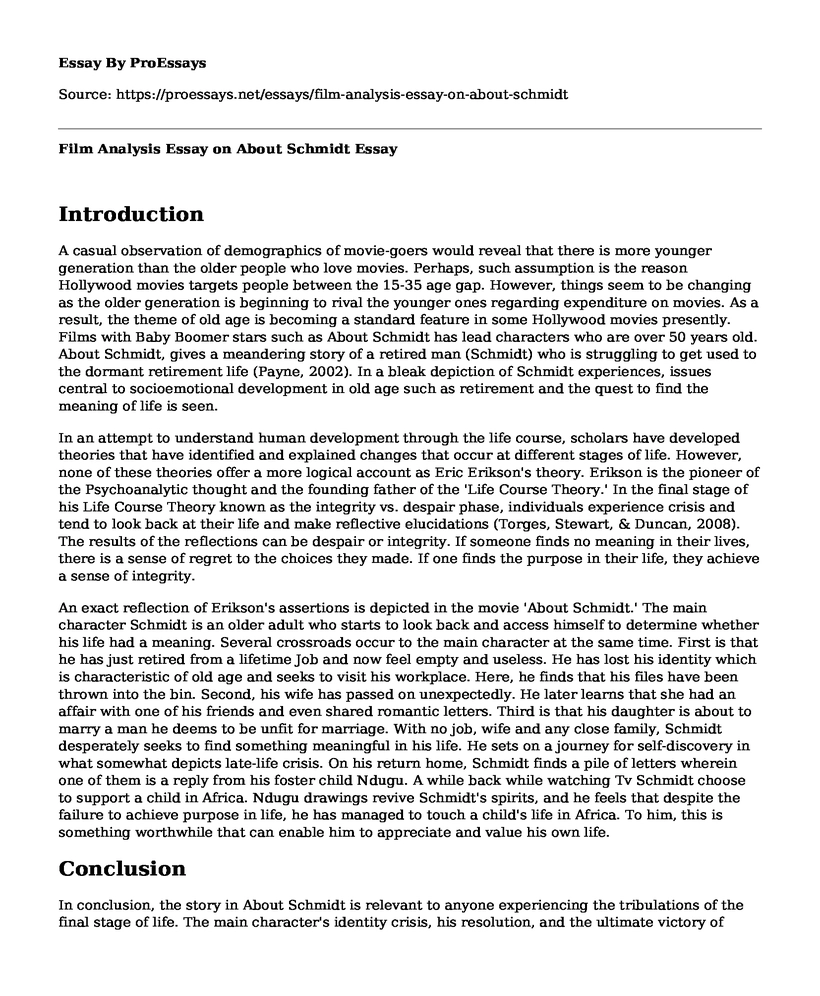Introduction
A casual observation of demographics of movie-goers would reveal that there is more younger generation than the older people who love movies. Perhaps, such assumption is the reason Hollywood movies targets people between the 15-35 age gap. However, things seem to be changing as the older generation is beginning to rival the younger ones regarding expenditure on movies. As a result, the theme of old age is becoming a standard feature in some Hollywood movies presently. Films with Baby Boomer stars such as About Schmidt has lead characters who are over 50 years old. About Schmidt, gives a meandering story of a retired man (Schmidt) who is struggling to get used to the dormant retirement life (Payne, 2002). In a bleak depiction of Schmidt experiences, issues central to socioemotional development in old age such as retirement and the quest to find the meaning of life is seen.
In an attempt to understand human development through the life course, scholars have developed theories that have identified and explained changes that occur at different stages of life. However, none of these theories offer a more logical account as Eric Erikson's theory. Erikson is the pioneer of the Psychoanalytic thought and the founding father of the 'Life Course Theory.' In the final stage of his Life Course Theory known as the integrity vs. despair phase, individuals experience crisis and tend to look back at their life and make reflective elucidations (Torges, Stewart, & Duncan, 2008). The results of the reflections can be despair or integrity. If someone finds no meaning in their lives, there is a sense of regret to the choices they made. If one finds the purpose in their life, they achieve a sense of integrity.
An exact reflection of Erikson's assertions is depicted in the movie 'About Schmidt.' The main character Schmidt is an older adult who starts to look back and access himself to determine whether his life had a meaning. Several crossroads occur to the main character at the same time. First is that he has just retired from a lifetime Job and now feel empty and useless. He has lost his identity which is characteristic of old age and seeks to visit his workplace. Here, he finds that his files have been thrown into the bin. Second, his wife has passed on unexpectedly. He later learns that she had an affair with one of his friends and even shared romantic letters. Third is that his daughter is about to marry a man he deems to be unfit for marriage. With no job, wife and any close family, Schmidt desperately seeks to find something meaningful in his life. He sets on a journey for self-discovery in what somewhat depicts late-life crisis. On his return home, Schmidt finds a pile of letters wherein one of them is a reply from his foster child Ndugu. A while back while watching Tv Schmidt choose to support a child in Africa. Ndugu drawings revive Schmidt's spirits, and he feels that despite the failure to achieve purpose in life, he has managed to touch a child's life in Africa. To him, this is something worthwhile that can enable him to appreciate and value his own life.
Conclusion
In conclusion, the story in About Schmidt is relevant to anyone experiencing the tribulations of the final stage of life. The main character's identity crisis, his resolution, and the ultimate victory of integrity over despair is an example of life affirmation that is inspiring to all.
References
Payne, A. (Director). (2002). About Schmidt [Motion Picture].
Torges, C. M., Stewart, A. J., & Duncan, L. E. (2008). Achieving ego integrity: Personality development in late midlife. Journal of Research in Personality, 42(4), 1004-1019.
Cite this page
Film Analysis Essay on About Schmidt. (2022, May 26). Retrieved from https://proessays.net/essays/film-analysis-essay-on-about-schmidt
If you are the original author of this essay and no longer wish to have it published on the ProEssays website, please click below to request its removal:
- Film Analysis Essay on Memento
- American Music Essay
- Review of the Film Titled the Apology 2016 Paper Example
- The Victual Painting Still Life of Oranges and Lemons with Blue Gloves by Vincent van Gogh Essay
- Essay Sample on a Media-Based Argument
- Summary of Gandhi Film - Essay Sample
- Censorship: A Relic of an Unlighted Age? - Essay Sample







